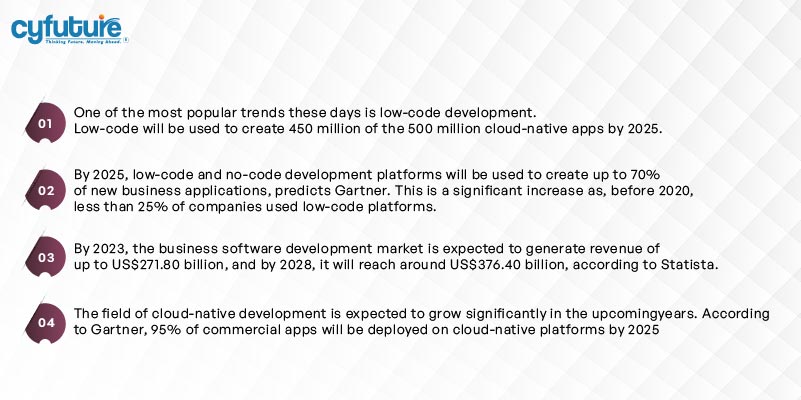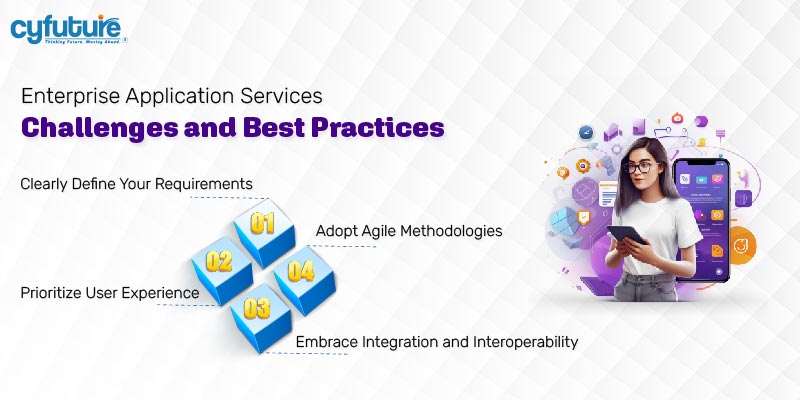-
Get Cloud GPU Server - Register Now!
Toggle navigation

In today’s quickly changing business environment, companies are constantly looking for novel approaches to improve efficiency, simplify processes, and gain a competitive edge. Using enterprise application services is a crucial tactic in this endeavor. These services have revolutionized the way organizations function by automating tedious operations and facilitating smooth data management and communication. But why are these services, and how can businesses employ them, so important in the contemporary digital era?
Furthermore, a closer look into enterprise application services indicates that they are composed of several tools and technologies designed to meet various business requirements. These services are critical to improving enterprise performance and promoting growth.
They range from customer relationship management (CRM) platforms to enterprise resource planning (ERP) solutions. Of all the various choices, however, bespoke application development stands out as being crucial to realizing the full potential of enterprise software solutions.
We’ll examine the intricacies of enterprise application services in this comprehensive piece, along with focusing on custom application development. To stay ahead of the competition, regardless of your level of expertise, understanding the importance of enterprise application services is essential for seasoned IT professionals and business executives navigating the digital landscape.
However, let’s look at a few stats and data before delving deep.

So let’s get started and learn the secrets of utilizing specialist software solutions to realize the maximum potential of your business.
Understanding the broader concept of enterprise application services is crucial before diving into the specifics of custom application creation. Enterprise application services are a set of software solutions designed to streamline and optimize various business processes within an organization. A broad range of functionalities are included in these services –
Businesses use CRM systems to manage relationships with both existing and new clients, expedite sales processes, and improve client retention and satisfaction. Enterprises employ them to optimize sales processes and augment client contentment and loyalty.
For improved decision-making and smooth information flow, finance, HR, supply chain management, and inventory management are all integrated into a single, centralized system.
By assisting with the planning, carrying out, and monitoring of supply chain operations, including procurement, manufacturing, logistics, and distribution, supply chain management (SCM) software improves operational efficiency and reduces costs.
Business growth and innovation are accelerated by the use of analytics and business intelligence tools by firms to analyze and understand data, identify trends, and take data-driven decisions.
Off-the-shelf enterprise software solutions offer a variety of benefits, but they may only sometimes align with an organization’s unique requirements and processes. Mobile Application development comes into play here. Applications are created to meet the requirements and objectives of a particular organization. They provide a high degree of flexibility, scalability, and functionality. There are numerous advantages to custom application development, including:
The flexibility to change and innovate in a constantly changing environment can be given to organizations by custom applications.
Employee productivity and operational efficiency may be greatly increased by streamlining processes and connecting disparate systems, freeing them up to concentrate on strategic goals rather than menial administrative duties. Simplifying processes and combining various systems will help achieve this.
Companies can stand out from their rivals by using apps that address specific business issues and provide distinct benefits.
Enterprise application services and custom application development have their advantages, but they also have their challenges. Budget constraints and resource limitations, technical complexities, and integration issues may be obstacles for organizations on their digital transformation journey. Utilizing the expertise of skilled software developers and IT professionals can help organizations overcome these obstacles.
Key best practices include several keys-

Setting clear business objectives, functional requirements, and technological specifications before beginning a custom application development project is essential to ensuring alignment with organizational priorities and objectives.
Scrum and Kanban promote iterative development, collaboration, and continuous feedback, which allows organizations to quickly prototype, test, and refine custom applications in response to changing requirements.
Custom applications must have a well-designed user interface to be successful since it has a direct impact on user acceptance, satisfaction, and productivity. Organizations may guarantee a smooth and captivating user experience with their customized software by emphasizing accessibility, simplicity of use, and user-friendly layout.
Read More: Why Do You Deserve the Advantage of Custom App Development Services?
Accepting compatibility and integration is essential in the digitally linked world of today. Ensuring data integrity, accuracy, and accessibility requires seamless collaboration and integration across many platforms and applications. Organizations can implement middleware technologies, open standards, and APIs to accomplish interoperability and smooth data interchange.
Taking care of safety and regulatory issues.
The security and compliance of enterprise applications are essential in an era of increasing cyber threats. Custom application development brings unique security and compliance challenges, such as vulnerabilities in custom code, data privacy risks, and regulatory compliance gaps, such as vulnerabilities in custom code. Organizations must prioritize security and compliance throughout the software development lifecycle to minimize these risks and safeguard sensitive data.
Early detection and correction of security flaws and vulnerabilities in custom software may be facilitated by using safe development methods, such as code reviews and vulnerability assessments, by businesses.
To protect unwanted access to sensitive data that is stored and supplied, custom apps might utilize access limits and data encryption.
Data protection laws and industry standards, such as HIPAA, the Payment Card Industry Data Security Standard, and the General Data Protection Regulation, must be followed by the application. By implementing suitable controls and finishing thorough compliance reviews, organizations may lower the legal and regulatory risks connected to the creation of custom applications.
Security incidents and data breaches can happen even with protections in place. Companies need to have strong incident response and disaster recovery protocols in place in order to successfully detect, contain, and mitigate security breaches.
Businesses have several opportunities to improve creativity, productivity, and growth with the help of corporate application services, particularly custom application development. Enterprises may fully use the potential of their own applications and maintain a competitive edge in the current digital economy by putting best practices into effect, optimizing return on investment, and addressing security and regulatory issues. Businesses must embrace the transformative potential of custom application development as technology develops and business requirements shift if they want to thrive in an environment that is becoming more complex and competitive. Invest in bespoke software, take a chance, and you’ll be well on your way to digital transformation and success.
To match the unique needs of your company, we tailor our solutions. In contrast to off-the-shelf software, custom software is created from the ground up to fit your particular company procedures. Businesses may increase productivity, efficiency, and creativity with this level of customization by automating processes, optimizing workflows, and seamlessly integrating diverse systems.
When selecting an enterprise application service provider, there are a number of factors to consider, such as reputation, experience in the real world, competence, and alignment with your organization’s objectives. Look for companies that have a history of success, appropriate job experience, and a broad range of services provided. To ensure that the company you select can fulfill your current and future needs, you should also consider factors like expandability, flexibility, and continuing support.
When assessing the return on investment of corporate application services, a number of factors must be taken into account, including reductions in costs, increases in revenue, improvements in efficiency, and improvements in customer satisfaction. To assess how these services affect their financial sustainability, organizations can track key performance indicators (KPIs) including shortened process cycle times, improved sales conversions, lower mistake rates, and higher customer retention.